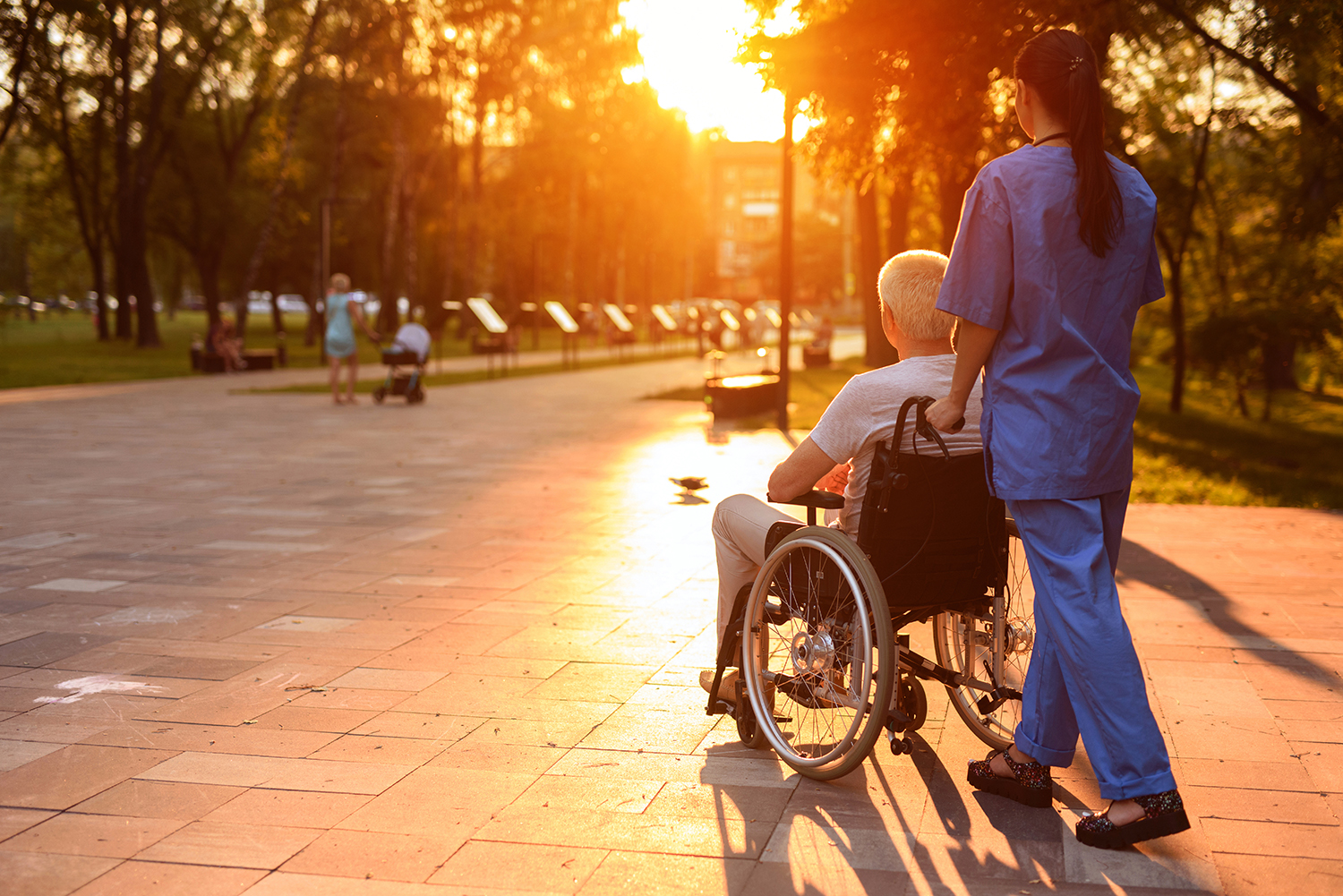Quarantine, social distancing challenge caring for elderly population
Article body
Kyle Kostelecky, an associate professor of human development and family studies at Auburn and an expert in gerontology, explains the challenges of caring for the elderly during quarantine due to the COVID-19 pandemic.
Why are older adults more susceptible to COVID-19?
The evidence from the initial outbreak tells us that the median age of the first 425 people infected with the coronavirus was 59. Why is that? As with Influenza A and B, the novel coronavirus is more likely found in people with lower immune systems and underlying conditions that limit the body’s ability to cope with and recover from illness. A person’s age and general health condition will determine their vulnerability to COVID-19. Even younger people with chronic health conditions are going to be more susceptible.
With social distancing, how do we protect our older family members from the virus yet still maintain contact?
Many of us are asking this very question—just at a time when they are more susceptible, what can I do? You might even be thinking, “Now is not the time to stay away but I’m being told it’s not safe to constantly check in with them, especially in-person.” As hard as it is, the best thing many of us can and should do is to limit those visits and keep our distance when we do check in. Less exposure will likely pay off in the end. It is a delicate balance, for sure. It is widely known that a lack of social connection for older adults has negative impacts on them. There is increasing evidence that intergenerational programming, where older adults are spending quality and quantity time with younger generations, is significantly improving the well-being of all generations. So how can we keep these connections going without jeopardizing everyone’s health?
-
Make sure you know the facts. Check with the CDC and local public health offices for accurate and current information. We are all frightened and concerned during uncertain times. Also, minimize watching, reading or listening to the news, instead limiting yourself to certain periods of the day for a limited time. Constantly seeking information and updates may add to anxiety and stress for you and those around you.
-
Keep washing those hands! Practice exceptional hygiene and if you need to spend time together, make sure it is in a place/facility with excellent cleanliness.
-
When anyone is feeling sick or under the weather, don’t take any chances. Stay away from each other until everyone is fully recovered from their illness.
-
Try lots of different ways to communicate, old and new. Phones, social media, online meeting platforms like Zoom or Skype, FaceTime, email or texts. These are great ways to connect when we have access to these methods.
-
An interesting idea connected to a plain old phone call is to watch a TV show together and talk about it while you are on the phone during commercial breaks. If you want your children to connect with their grandparents, have them read to grandma and grandpa over the phone. This is great practice for emerging readers. Grandpa and grandma can read to them too.
-
-
When you do connect, whether it is in person or via another method, share stories and pictures. This feels a bit more intimate and makes an emotional connection that can be satisfying and lasting. There is often great peace when you can return to a photo and be reminded of a conversation or story.
-
Finally, when the time comes for you to check in to just see how your older adult family member is doing, ask specific questions like, “What did you do today?” or “What are your plans for tomorrow?” Just a simple, “How are you doing?” may elicit less helpful and meaningful conversations. Making these phone calls will likely help you feel more connected too.
Nursing homes aren’t letting residents have visitors, what is a family to do under quarantine?
This is one of the most distressing visuals we see on the news—younger family members or spouses waving through windows at their aging relative under quarantine in a nursing home or long-term care facility. Try to understand that this kind of isolation for the most vulnerable of our family is actually good for their health. It is logical to suggest that the less exposure for all of us helps to slow down the expantion of the pandemic. When you find yourself in a situation that you can visit the facility, but have to remain outside and connect through a window for example, make sure you are in a positive state of mind and relay that positive image to your loved one on the other side of the window. Showing your best self will help put your older family member in a better mood and give them confidence that you are healthy and well. Some things you can do to keep them connected to what is going on in your lives include bringing photos of regular daily activities (with large, handwritten captions on pieces of paper) or create a multiple person “sign” with each of you spelling out, “I love you Dad/Grandpa!” This is a difficult situation, no doubt. Check with the facility staff and ask if you can make regular visits—this will give your family member something to look forward to. Also, do what you can to support and honor those caring for your older family member like send thank you notes, provide some much needed supplies or simply be kind to them when you talk with them, recognizing the difficulty of their job working in this environment.
What are some of the mental health and psychosocial considerations during COVID-19 outbreak?
We know that older adults, especially those in isolation and with cognitive decline/dementia, may become more anxious, angry, stressed, agitated and withdrawn during self- or mandatory quarantine. You may be able to recognize increasing stress in your loved one if they seem to exhibit irrational fear about other things besides the coronavirus, tell you they aren’t sleeping as well or can’t seem to concentrate like they used to, their chronic health conditions seem to be worsening or they show signs of increased use of alcohol, tobacco or other drugs (even over-the-counter medications like pain reliever). The kinds of practical and informal supports mentioned here can help reduce or even alleviate some of this. Sharing simple facts, providing clear information and doing so in a respectful and patient manner can help older adults feel more at ease and less anxious. Encourage taking a break from TV and news about the pandemic. Get them to just move—take deep breaths, stretch, meditate or take a short walk. Help them to unwind a bit by doing an activity with them that they enjoy doing. Finally, you and your older family should be talking with people you both trust about your concerns and how each of you are feeling. Taking care of emotional health is just as important during times like these.
What can I do about my feelings of uncertainty for me and my older adult family member?
There is uncertainty, confusion, disruption and ambiguity related to the COVID-19 pandemic. These feelings lead to anxiety and stress in families. “What should we do about it? What will it do to us? I feel overwhelmed and lost.” It may not even be the virus itself, but all the questions surrounding it. One of the things we struggle with during this time is boundary ambiguity. Our loved one may be in a nursing home or care facility and we can’t visit them, but we think about them often. This can be difficult and we have no way of resolving this “loss” at the moment. They are still a member of our family but we don’t have access to them in the ways we are used to. We are even uncertain if we will ever be able to return to “normal.” Pauline Boss, the seminal scholar in this field, suggests some ways we can ease the effects of ambiguous loss include:
-
Finding meaning in the situation – define what it means to you and focus on the positive parts of that understanding
-
Controlling what you can control – your reaction to the situation
-
Reconstruct your identity during this time – don’t isolate yourself or resist the change
-
Anger is natural and so is guilt – deal with these emotions, knowing that they are normal
-
You can miss what you are currently losing in this relationship while at the same time being grateful for what you still have
-
Redefine and reshape the loss into something beneficial – help others in similar situations and seek hope
Auburn University is a nationally ranked land grant institution recognized for its commitment to world-class scholarship, interdisciplinary research with an elite, top-tier Carnegie R1 classification, life-changing outreach with Carnegie’s Community Engagement designation and an undergraduate education experience second to none. Auburn is home to more than 30,000 students, and its faculty and research partners collaborate to develop and deliver meaningful scholarship, science and technology-based advancements that meet pressing regional, national and global needs. Auburn’s commitment to active student engagement, professional success and public/private partnership drives a growing reputation for outreach and extension that delivers broad economic, health and societal impact.






